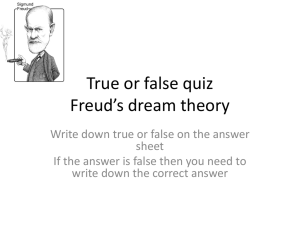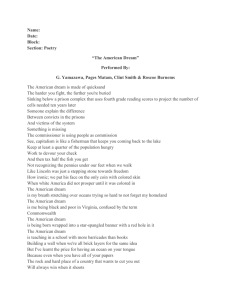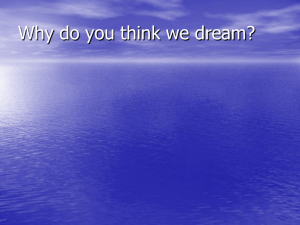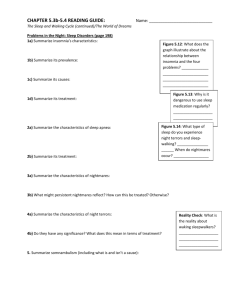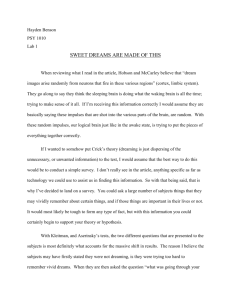Dreams and Interpretation
advertisement
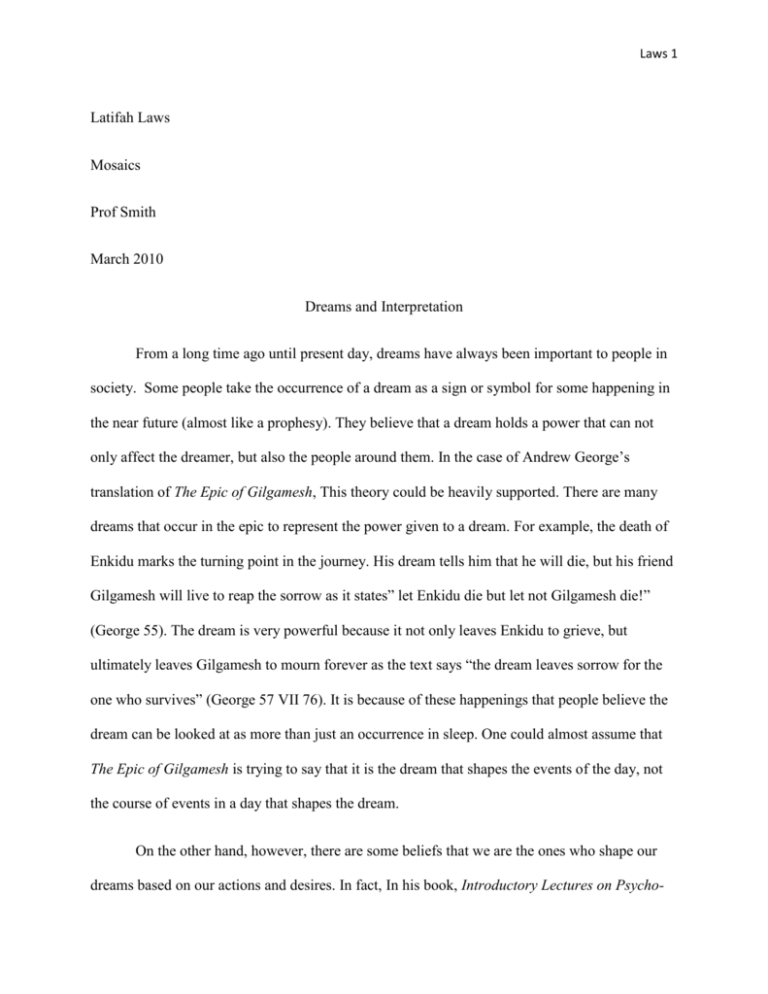
Laws 1 Latifah Laws Mosaics Prof Smith March 2010 Dreams and Interpretation From a long time ago until present day, dreams have always been important to people in society. Some people take the occurrence of a dream as a sign or symbol for some happening in the near future (almost like a prophesy). They believe that a dream holds a power that can not only affect the dreamer, but also the people around them. In the case of Andrew George’s translation of The Epic of Gilgamesh, This theory could be heavily supported. There are many dreams that occur in the epic to represent the power given to a dream. For example, the death of Enkidu marks the turning point in the journey. His dream tells him that he will die, but his friend Gilgamesh will live to reap the sorrow as it states” let Enkidu die but let not Gilgamesh die!” (George 55). The dream is very powerful because it not only leaves Enkidu to grieve, but ultimately leaves Gilgamesh to mourn forever as the text says “the dream leaves sorrow for the one who survives” (George 57 VII 76). It is because of these happenings that people believe the dream can be looked at as more than just an occurrence in sleep. One could almost assume that The Epic of Gilgamesh is trying to say that it is the dream that shapes the events of the day, not the course of events in a day that shapes the dream. On the other hand, however, there are some beliefs that we are the ones who shape our dreams based on our actions and desires. In fact, In his book, Introductory Lectures on Psycho- Laws 2 Analysis, Sigmund Freud argues that “Dreams are things which get rid of (psychical) stimuli disturbing the sleep, by the method of hallucinatory satisfaction” (Freud 167).Therefore in contrast to the beliefs in The Epic of Gilgamesh, based on Freud and his beliefs, one can assume that when we dream, it is our unconscious mind releasing thoughts that we un-noticeably took in or is taboo to the external world. It is our thoughts, actions, and desires that shape a dream, not the other way around. With the scientific study and experimentation of Freud’s theory, it is easier to show how the use of dreams represented by The Epic of Gilgamesh fails to stand as a concrete theory. It is true that the dreams the epic mentions possess symbolism and room for interpretation, like some of the dreams Freud describes; however, based on detailed evidence, Freud shows how it is impossible for dreams to hold enough power to manipulate the outcome of people’s lives. If we take the symbolism of dreams from both theories, we will find that they are interpreted in different ways. In the case of The Epic of Gilgamesh, symbolism acts as what is to come. It tells the dreamer either what to look forward to or how an outcome will play out. For example, Before Enkidu arrives in Gilgamesh’s life, Gilgamesh has a dream of a rock falling from the sky as the text states, “O mother, this is the dream I had in the night-/The stars of heavens appeared above me./like a rock from the sky one fell down before me” (George 10 I 146). The rock that fell from the sky represents Enkidu, who was made from a piece of clay pinched from the goddess, Aruru. The symbolism shows what is to come by having a rock fall from the heavens (Enkidu was made from the heavens out of clay). It also shows how the outcome of an event will play out because also in Gilgamesh’s dream he describes to his mother how he could not move it, but he loved it and it was made into his equal (George 10 I 146-157). Laws 3 Low and behold Enkidu came into Gilgamesh’s life and after a fight they became the best of friends and Enkidu was made equal to Gilgamesh, thus representing how dreams used symbolism to show the dreamer their fate. Freud interprets the use of symbolism in dreams far more differently. For starters, It is not the symbolism in the dream that tries to tell the dreamer their fate, which is pointed out by Freud when he says “…the events of the previous day, which were the instigators of the dream” (Freud 186). Also in this case, symbolism does not nearly represent as many things as the symbolism in Gilgamesh’s dreams. According to Freud, “The range of things which are given representation is not wide: the human body as a whole, parents, children, brothers and sisters, birth, death, nakedness, and something else besides” (Freud 188). He goes on to point out how there is ambiguity between symbolic and allusive representation. One of the most significant differences between the two theories is the reliance on dream symbolism. In the theory supported by The Epic of Gilgamesh, interpreting the symbolism in dreams was very important. For instance, When Gilgamesh and Enkidu go to the cedar forest, every night they pray to the gods to allow Gilgamesh to dream so he can see what his fate will be. He needs Enkidu to interpret the dreams for him because there is much symbolism he cannot understand (George 30-38). In contrast, the worth of symbolism is much less relied in when there are other more useful methods such as the methods Freud uses. He argues this fact when he says “Interpretation based on knowledge of symbols is not a technique which can replace or compete with the associative one’ (Freud 186). By proving that symbolism interpretation is not the best method, Freud has weakened one of the sole factors of the other theory thus showing that dreams are not as powerful as they are believed to be. Laws 4 One of the greatest reasons that Freud points out which represents why dreams should not be considered as powerful as they are is because of the taboo thoughts that humans dream about. He claims “The ego, freed from all ethical bonds, also finds itself at one with all the demands of sexual desire, even those which been condemned by our aesthetic upbringing and those which contradict all the requirements of moral restraint” (Freud 175). When we are sleep our unconscious mind releases thoughts that are undesirable in the external world. He goes on to claim that the dreams are censored because of this and the parts that are taboo or undesirable are usually the things that we can’t remember when we wake up. This censorship shows how dreams are too weak to control our conscious mind. For example, in a study conducted by Freud, a lady talks about a dream she had. Ultimately, Freud arrives to the conclusion that she was dreaming about sexual relations with her son, but the dream distorted the parts where the actual implications were made (Freud 168-170). Now it was clear that the lady did not want to have sexual relations with her son. So unlike the Gilgamesh theory where people would have acted based on a dream that they had, her dream remained as her dream and she does not actually act on it. Freud’s findings to support his theory on dreams show the flaws in the theory of the power of dreams. He shows through investigation and research how it makes much more sense for dreams to be triggered by events and desires that people go through as opposed to dreams having the power to triggers people’s fate. Through factors such as dream distortion and the discredibility of symbolism, Freud’s theories show how the theory of dreams described in The Epic of Gilgamesh fails to show concrete evidence of truth. Laws 5
